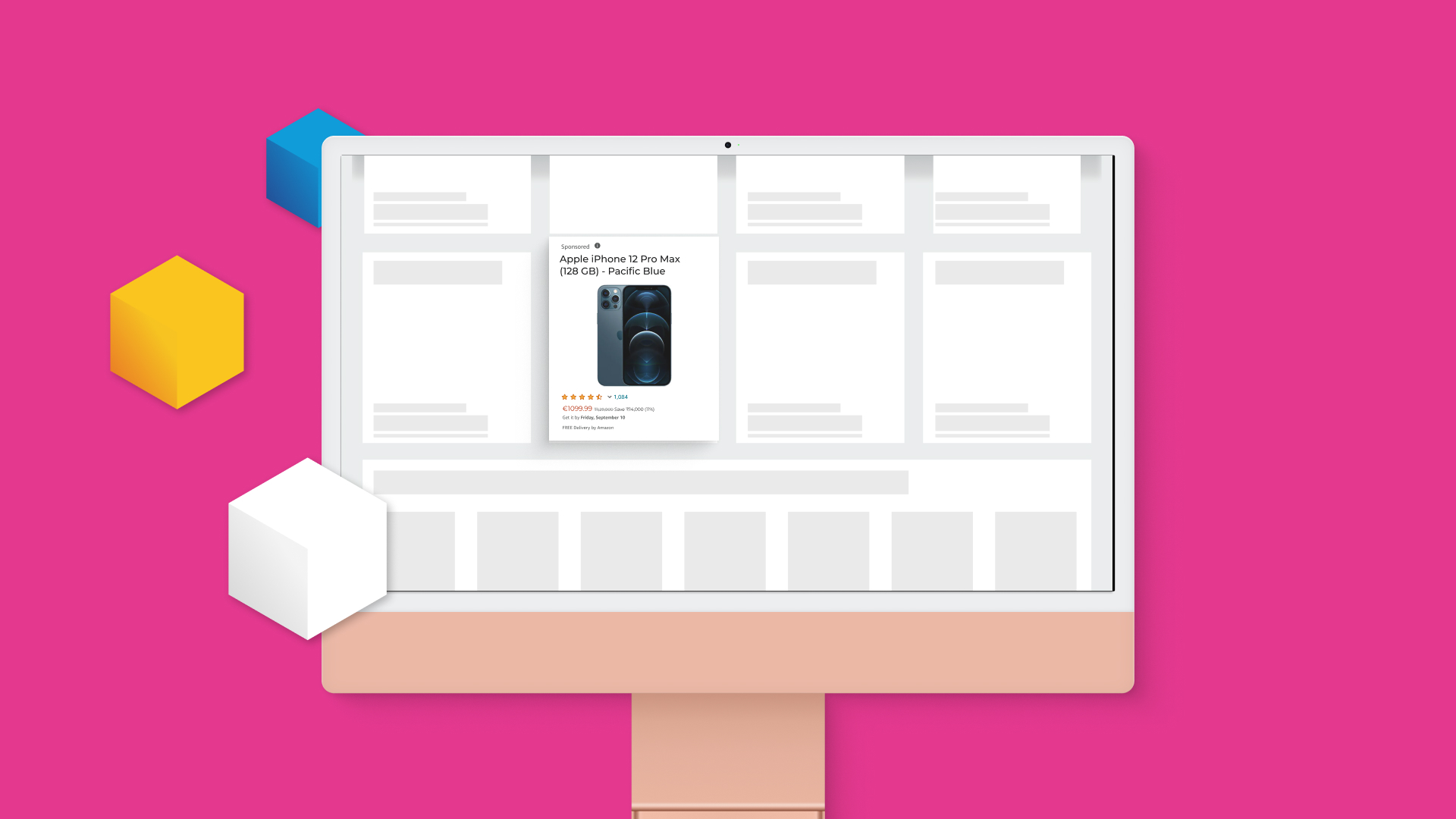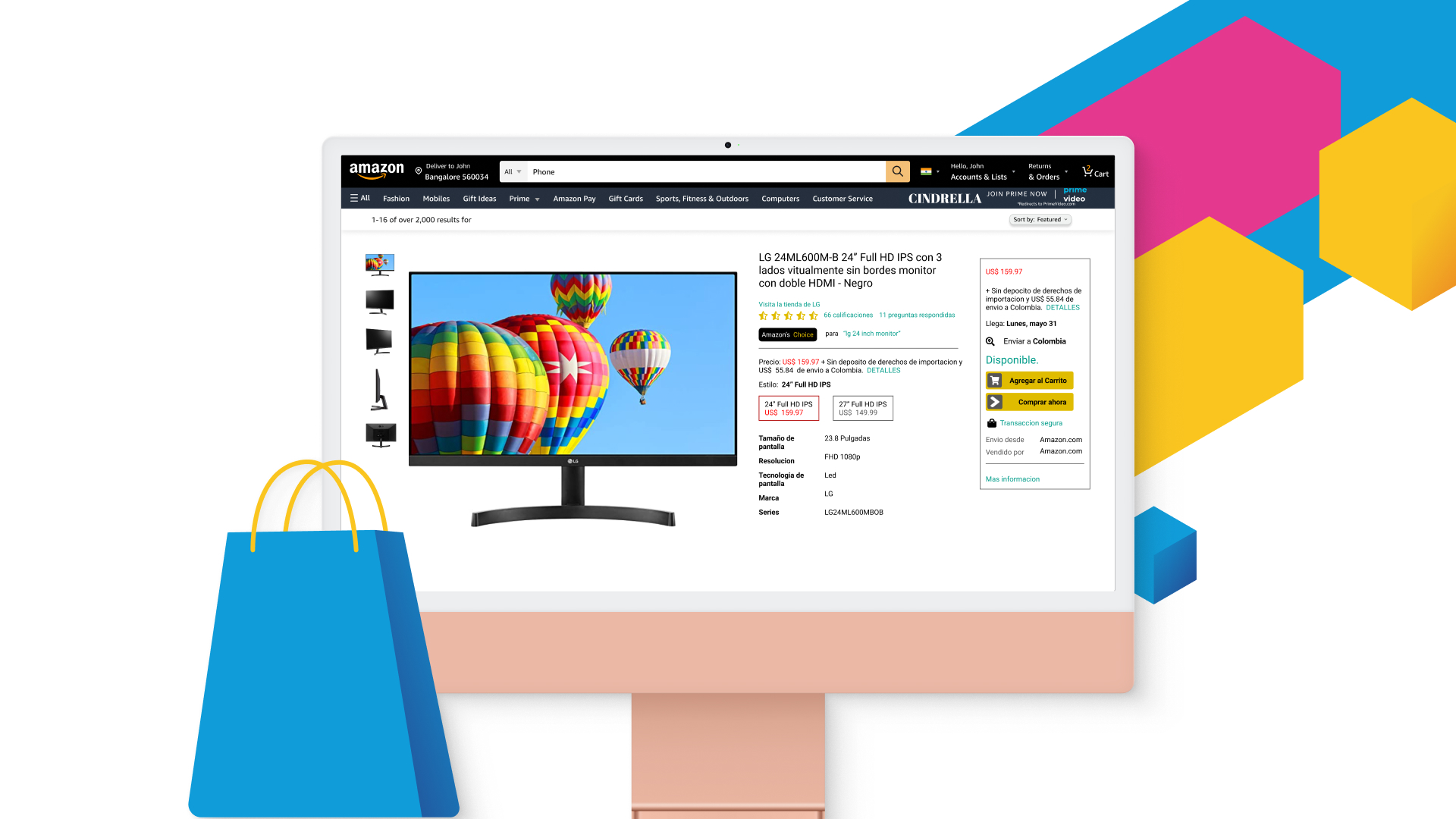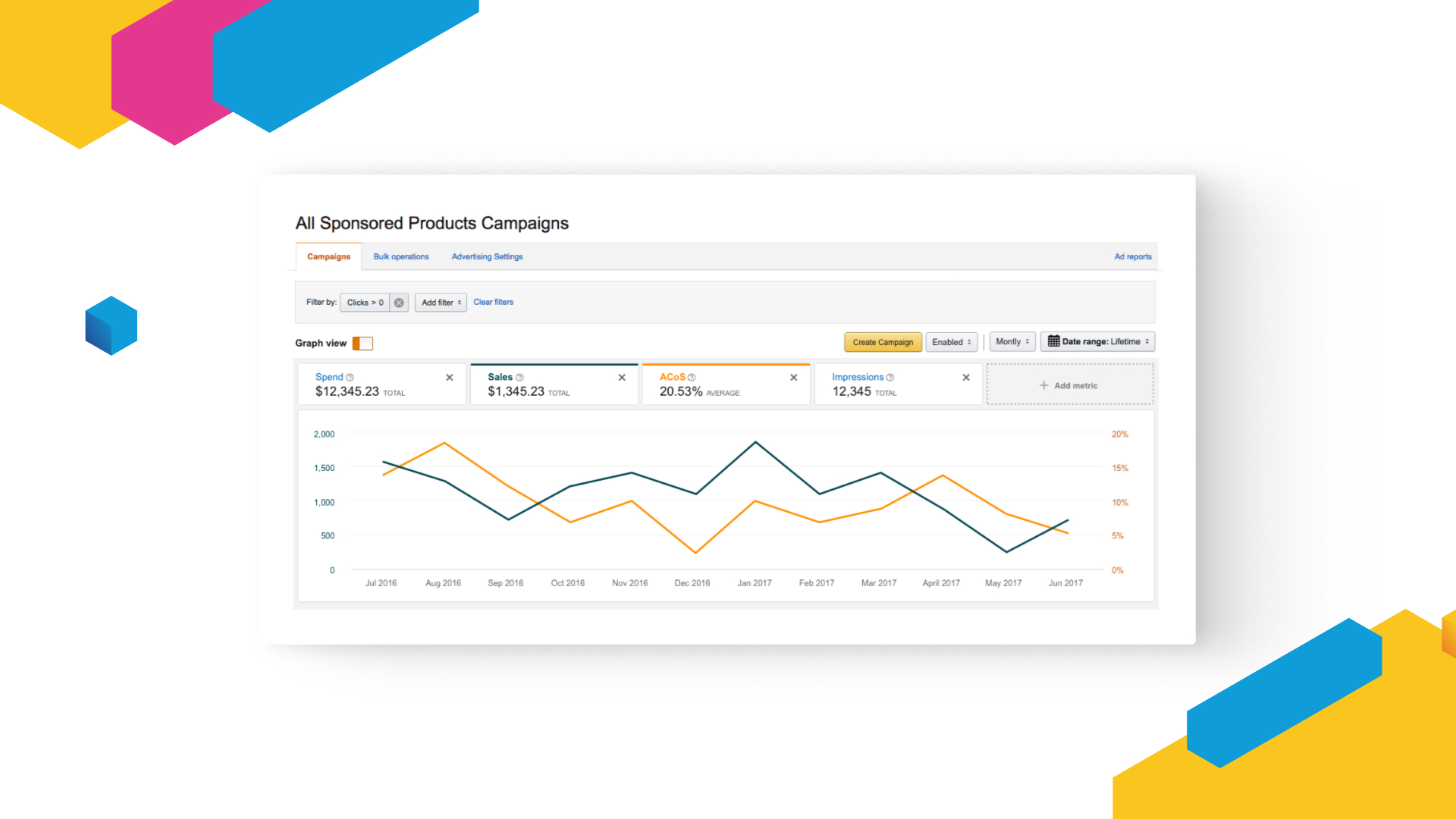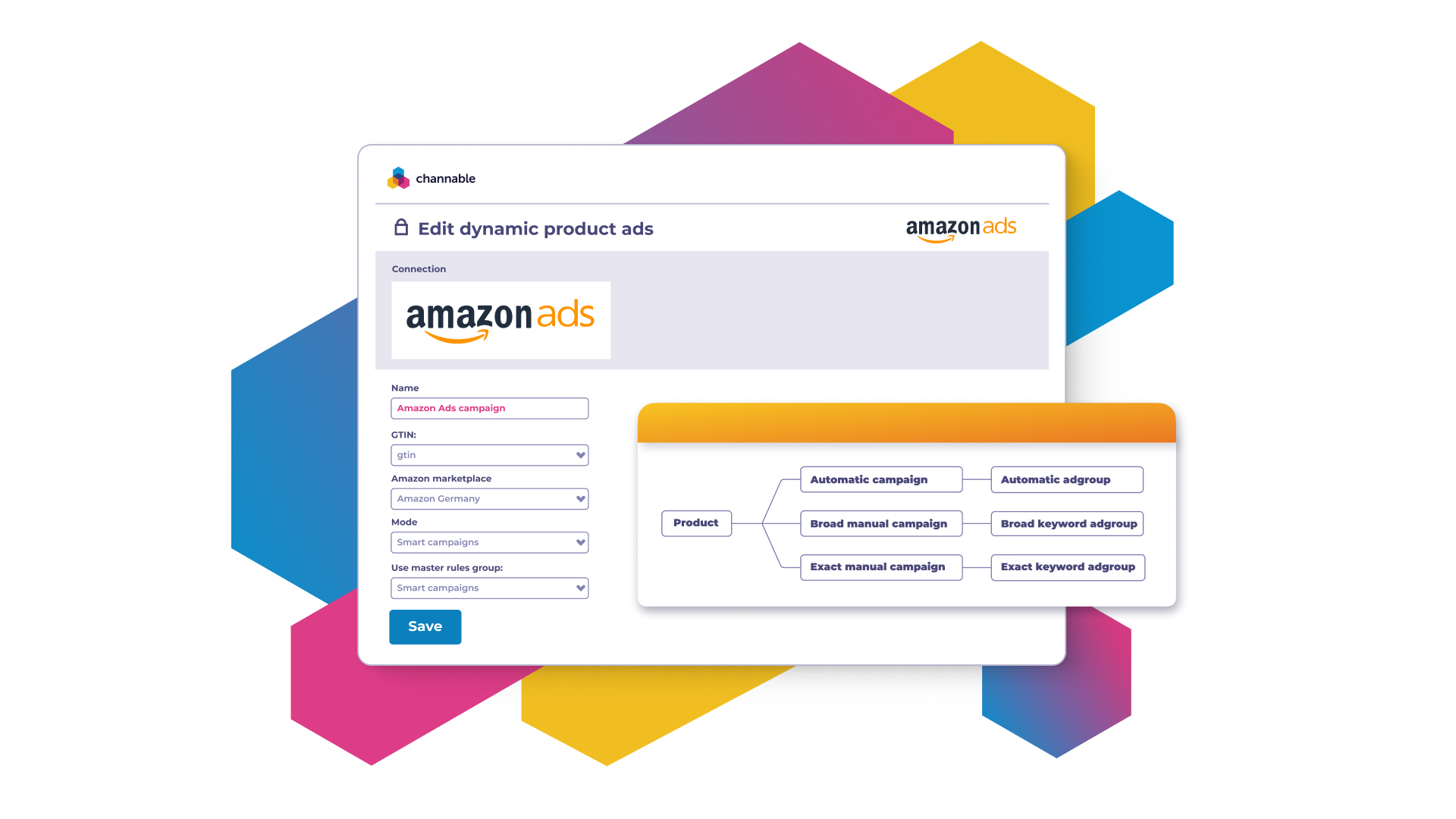Everything you Need to Know about Amazon Sponsored Products


With an estimated 1.9 million active sellers competing for sales, it's no wonder that standing out on Amazon can be a challenge. But fear not, budding entrepreneurs and established sellers alike – there's a secret weapon that can help you capture the attention of potential customers and boost your sales: Amazon Sponsored Products.
In this guide, we'll give you an overview of Amazon Sponsored Products and explain why they can be an asset to your multichannel eCommerce strategy. We'll cover everything from setting up campaigns to optimizing bids and managing your budget. By the end of this article, you’ll be well-equipped to use Amazon Sponsored Products to drive more traffic to your product pages and increase sales.
tl;dr
- Amazon Sponsored Products are cost-per-click (CPC) ads that promote individual product listings.
- As Sponsored Products are featured at the top of search results, they offer sellers increased visibility and higher conversion rates.
- Best practices include focusing on high-traffic keywords, using negative keywords, optimizing product detail pages, starting with automatic targeting, and monitoring results.
- Amazon recommends starting with a daily budget of $10 (or the equivalent in your currency) to keep your ads visible throughout the day.
- Automation tools can help to streamline tasks like updating listings, optimizing bids, and analyzing performance.
What are Amazon Sponsored Product Ads?
Imagine you're browsing Amazon looking for a new pair of headphones. As you type in your search term, you notice some products at the top of the results page with a little label that says "Sponsored".
These are Amazon Sponsored Products, which are cost-per-click (CPC) ads that blend in with organic search results and promote individual product listings.
Amazon Sponsored Products work by matching a visitor’s search terms with relevant products. When a potential customer clicks on a Sponsored Product ad, they’re taken directly to the product detail page on Amazon where they can learn more about it and make a purchase.
In 2023, Amazon announced that Sponsored Products Ads would also start to appear on premium apps and websites such as Pinterest, BuzzFeed, Hearst Newspapers, Raptive, Ziff Davis, Lifehacker, and Mashable.
How do Sponsored Products Ads work?
You choose the keywords that best match your products and set a bid – the maximum amount you're willing to pay for each click on your ad.
When a shopper searches for a keyword that matches your ad, your product listing has the potential to appear at the top of the search results page or even within the product page itself - usually in the related products section.
The beauty of this approach is that you only pay for clicks, meaning you only invest when someone actively engages with your ad. This makes it a cost-effective way to reach a wider audience and boost your visibility on Amazon.
Just an FYI, you need to be an Amazon Seller to launch Sponsored Product Ads. Not an Amazon Seller? Check out our handy guide to get started selling on Amazon.
Why Amazon Sponsored Products are important
Sponsored Products are a win-win for both advertisers and shoppers. Advertisers can reach a wider audience and increase their sales, while shoppers discover new and relevant products that they may have overlooked without the ads.
In highly competitive product categories, Amazon Sponsored Ads offer a powerful solution to elevate your brand and products, especially if you're a new seller or your listings have lower review counts or overall visibility.
Are you already an Amazon Seller? Here are some of the main benefits of using Amazon Sponsored Product Ads:
- Increased product visibility: Sponsored Products have a prominent placement on Amazon search results pages, giving your products a higher visibility compared to organic listings. This top-of-the-page positioning makes your products more likely to be noticed by shoppers, increasing the likelihood of clicks and conversions.
- Enhanced brand awareness: When shoppers click on your Sponsored Products ads, they’re taken directly to your product detail page - giving potential buyers an opportunity to learn more about your brand and your product offerings.
- Higher click-through rates: Sponsored Product Ads are served to people who are actively searching for your products, allowing you to reach potential customers when they are most likely to click and buy.
- Cost-effective advertising: Sponsored Products campaigns are based on an auction-based model, where you bid on specific keywords that match your products. You only pay when someone clicks on your ad, and you can control your ad spend by setting a daily or lifetime budget.
- Boosted conversion rates: According to Amazon, sellers see an average weekly 50% increase in units ordered within the first year after launching a Sponsored Products campaign.
Limitations of Amazon Sponsored Products
While Amazon Sponsored Ads can be an effective way to increase product visibility and sales, they also have some limitations that sellers should be aware of:
- High costs: Amazon Sponsored Products ads can be expensive, especially in competitive product categories. The cost-per-click (CPC) can vary depending on the demand for your keywords, the competition from other sellers, and the overall search volume. If you’re not careful, you could easily overspend on your advertising campaigns.
- Competition: Amazon is a crowded marketplace, and many other sellers are using Sponsored Ads to promote their products, making it difficult to stand out from the competition and get your ads to show up in front of potential customers.
- Time commitment: Setting up and managing Sponsored Products campaigns can be time-consuming, especially if you’re new to the platform and don’t have a dedicated ads manager. You’ll need to research keywords, optimize your bids, and track your campaign performance.
How to set up an Amazon Sponsored Products campaign
Ready to get started? Here’s a step-by-step guide to creating your first Amazon Sponsored Products campaign:
- Log in to your Seller Central account and navigate to the Advertising tab. From there, select Campaign Manager and then click the “Create Campaign” button. Under “Choose your campaign type”, click “Sponsored Products”.
- Write a descriptive name for each campaign, such as “Q3_BackToSchoolPromo” or “LaptopCase_KeywordTargeting”
- Choose individual products or groups of products, depending on how many products you want to promote.
- Select the keywords you want to target. Make sure to include descriptive keywords relevant to the product and its category.
- Set your daily budget (how much you’re willing to spend each day on clicks) and the campaign duration (how long your ads will run).
- Decide if you want to target search terms or serve ads based on product interests, demographics, or if a customer has viewed a product before.
- Choose your bidding strategy: fixed bids will use your exact bid, while dynamic bids will lower or raise your bid depending on whether your ad is likely to lead to a sale.
- Click “Launch Campaign” to push your ads live.
Amazon Sponsored Products: 7 best practices
Getting Sponsored Products to work for you is about putting together a smart game plan that covers everything from choosing the best keywords to constantly optimizing your campaigns.
Here are some best practices to improve the performance of your Sponsored Product Ads:
1. Focus on high-traffic keywords
These are keywords that are more likely to lead to clicks and purchases. You can find these keywords by using Amazon's Search Term Report and analyzing which keywords are generating the most clicks and conversions. Examples include: “protective laptop case”, “noise canceling wireless headphones”, and “insulated travel mug”.
2. Use negative keywords and negative product targeting
Including negative product and brand filters in your campaigns ensures that your ads aren't displayed for irrelevant search queries or product pages. Negative keywords and product targeting can include competition keywords, brand names, ASINs (Amazon Standard Identification Numbers), and generic keywords. For example, if you sell running shoes, you might exclude keywords like "shoes" or "athletic shoes" because these keywords could attract clicks from people who are not specifically interested in running shoes.
3. Optimize your products and detail pages
When shoppers click on your ad, they land on your Amazon product detail page. That’s why it’s important to keep the quality of your product information high as detail pages directly impact your ad performance and sales. Improvements you can make include: keeping your products competitively priced, creating a strong product title, selecting products with high reviews, using at least 4 high-quality product images, and including a list of bullet points of your product’s key features.
4. Start with automatic targeting
If you’re new to Amazon Sponsored Product Ads, it’s a good idea to select the automatic targeting feature as it’s the easiest and quickest way to get started. With automatic targeting, Amazon automatically matches your ads to keywords and products, saving you time compared to manual targeting.
5. Switch to manual targeting
Once your automatic campaign has had time to gather data, it can provide valuable insights into which search terms are generating conversions and which are not. This information can be applied to your manual campaigns to refine your targeting and boost sales. Manual targeting gives you more control over which keywords you target, allows you to set custom bids, and enables you to target specific products or entire categories.
6. Set a realistic daily budget
Before you set up your Sponsored Products, make sure you establish a monthly budget for your Amazon Ads campaigns. This will help you come up with your daily budget. Amazon recommends a minimum daily budget of $10 (or the equivalent in your currency) to keep your ads live throughout the day.
7. Monitor your results
You can generate several reports to measure the performance of your Sponsored Product Ads. The “Placement Report” provides insights into your ads' performance across different placements on Amazon, while the “Performance Over Time Report” gives you an overview of your clicks and spend to track your average cost-per-click and total spend over time. Use these insights to make informed decisions about whether you need to increase your bid to boost your placement or cut low-performing keywords.
How automation can help with Amazon Sponsored Products
Want to supercharge your Sponsored Products campaigns? Tap into the power of automation. These powerful tools take care of mundane tasks, like automatically updating product listings, optimizing placements, and analyzing performance.
There are a number of different ways to automate your Sponsored Products campaigns, but some of the most common include:
- Using a product feed management tool: Listing your products, matching them with Amazon product categories, and managing the stock count is time-consuming and error-prone if you do it manually. A product feed management tool can help you to keep your product information up-to-date and consistent across all of your eCommerce platforms.
- Using PPC automation tools: PPC solutions specifically tailored to Amazon Sponsored Product Ads allow you to easily create complete ad campaign structures for multiple products and languages at scale.
- Using campaign and keyword automation rules: You can set up rules that will automatically adjust your bids, add or remove keywords, move keywords between campaigns, or blacklist certain keywords based on specific criteria.
- Using bid automation tools: There are a number of tools available that can automatically adjust your bids based on real-time data. This can help you to maximize your return on investment (ROI) and avoid overspending.
Explore more about how automation can help your Amazon advertising strategy on the Channable website.
Amazon Ads is part of Channable's end-to-end marketplace solution, making it even easier for advertisers to access the benefits of Amazon PPC adverts. Learn how Channable can optimize and accelerate your Amazon PPC campaigns and how you can manage thousands of ads across marketplaces. Sign up for a free trial today!
Want more like this?
Want more like this?
Insight delivered to your inbox
Keep up to date with our free email. Hand picked whitepapers and posts from our blog, as well as exclusive videos and webinar invitations keep our Users one step ahead.
By clicking 'SIGN UP', you agree to our Terms of Use and Privacy Policy


By clicking 'SIGN UP', you agree to our Terms of Use and Privacy Policy
Other content you may be interested in
Categories

Want more like this?


Want more like this?
Insight delivered to your inbox
Keep up to date with our free email. Hand picked whitepapers and posts from our blog, as well as exclusive videos and webinar invitations keep our Users one step ahead.
By clicking 'SIGN UP', you agree to our Terms of Use and Privacy Policy











![The State of Digital Content [2026 Edition] The State of Digital Content [2026 Edition]](https://images.bizibl.com/sites/default/files/content-meeting-480.jpg)

